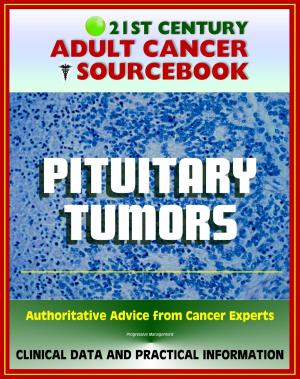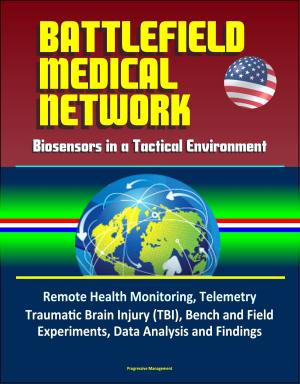21st Century Understanding Cancer Toolkit: Complete Guide to Clinical Trials - Finding Trials, Benefits and Risks, Protocols, Drugs and Therapies, In-Depth Workbooks and Guides for Outreach
Nonfiction, Health & Well Being, Health, Ailments & Diseases, Cancer, Medical| Author: | Progressive Management | ISBN: | 9781458076472 |
| Publisher: | Progressive Management | Publication: | February 9, 2011 |
| Imprint: | Smashwords Edition | Language: | English |
| Author: | Progressive Management |
| ISBN: | 9781458076472 |
| Publisher: | Progressive Management |
| Publication: | February 9, 2011 |
| Imprint: | Smashwords Edition |
| Language: | English |
This complete guide to cancer clinical trials has authoritative information and practical advice from the nation's cancer experts about all aspects of these important research studies that contribute to the detection, prevention, and treatment of cancer. Starting with the basics, and advancing to detailed patient-oriented information, this comprehensive compilation gives empowered patients, families, caregivers, and healthcare professionals the information they need to understand clinical trials. In addition to easy-to-read discussions, there is substantial advanced material for physicians and health care professionals. Conveniently organized contents include: Background Information, Cancer Clinical Trials -The Basic Workbook, Cancer Clinical Trials - The In-Depth Program, Cancer Clinical Trials: A Resource Guide for Outreach, Education, and Advocacy, Clinical Trials at NIH, How To Find A Cancer Treatment Trial: A Ten Step Guide, If You Want To Find Ways To Prevent Cancer: Learn About Prevention Clinical Trials, Taking Part in Cancer Treatment Research Studies, Cancer Clinical Trials, More Choices in Cancer Care, Access to Investigational Drugs, Clinical Trials Conducted by the National Cancer Institute's Center for Cancer Research at the National Institutes of Health Clinical Center, The NCI/VA Agreement on Clinical Trials Questions and Answers, TRICARE Beneficiaries Can Enter Clinical Trials for Cancer Prevention and Treatment Through a Department of Defense and National Cancer Institute Agreement, NCI’s Clinical Trials Cooperative Group Program, Cancer Research Funding, Supplement - General Cancer Information And Resources. Some of the questions answered include: What is a clinical trial? * Why participate in a clinical trial? * Who can participate in a clinical trial? * What happens during a clinical trial? * What is informed consent? * What are the benefits and risks of participating in a clinical trial? * What are side effects and adverse reactions? * How is the safety of the participant protected? * What should people consider before participating in a trial? * What kind of preparation should a potential participant make for the meeting with the research coordinator or doctor? * Does a participant continue to work with a primary health care provider while in a trial? * Can a participant leave a clinical trial after it has begun? * Where do the ideas for trials come from? * Who sponsors clinical trials? * What is a protocol? * What is a placebo? * What is a control or control group? * What are the different types of clinical trials? * What are the phases of clinical trials? * What is "expanded access". There is information on: Types and Phases * Treatment Trials * Prevention Trials * How Participants Are Assigned in Randomized Trials * The Clinical Trial Protocol * Exercises * Advancing Cancer Care through Clinical Trials * Evaluating Clinical Trial Results * Approving New Drugs * Participant Protection in Clinical Trials * History of Participant Protection * The Informed Consent Process * Review Committees * Barriers to Clinical Trial Participation * Barriers for Health Care Professionals * Barriers for General Population * Barriers for Racially or Ethnically Diverse Populations * Cost Barriers * Finding Clinical Trials Organizations * Glossary. The public understands very little about clinical trials. Some people are fearful of being "guinea pigs," even though participants in clinical trials receive high-quality care. Other people are not aware of clinical trials as an option, do not understand how they work, or do not have access to them. Likewise, health care professionals may be unaware of appropriate clinical trials, may not want to refer people out of their practice, may believe that standard therapy is best, or may think that getting involved in clinical trials will add an undue administrative burden to their work.
This complete guide to cancer clinical trials has authoritative information and practical advice from the nation's cancer experts about all aspects of these important research studies that contribute to the detection, prevention, and treatment of cancer. Starting with the basics, and advancing to detailed patient-oriented information, this comprehensive compilation gives empowered patients, families, caregivers, and healthcare professionals the information they need to understand clinical trials. In addition to easy-to-read discussions, there is substantial advanced material for physicians and health care professionals. Conveniently organized contents include: Background Information, Cancer Clinical Trials -The Basic Workbook, Cancer Clinical Trials - The In-Depth Program, Cancer Clinical Trials: A Resource Guide for Outreach, Education, and Advocacy, Clinical Trials at NIH, How To Find A Cancer Treatment Trial: A Ten Step Guide, If You Want To Find Ways To Prevent Cancer: Learn About Prevention Clinical Trials, Taking Part in Cancer Treatment Research Studies, Cancer Clinical Trials, More Choices in Cancer Care, Access to Investigational Drugs, Clinical Trials Conducted by the National Cancer Institute's Center for Cancer Research at the National Institutes of Health Clinical Center, The NCI/VA Agreement on Clinical Trials Questions and Answers, TRICARE Beneficiaries Can Enter Clinical Trials for Cancer Prevention and Treatment Through a Department of Defense and National Cancer Institute Agreement, NCI’s Clinical Trials Cooperative Group Program, Cancer Research Funding, Supplement - General Cancer Information And Resources. Some of the questions answered include: What is a clinical trial? * Why participate in a clinical trial? * Who can participate in a clinical trial? * What happens during a clinical trial? * What is informed consent? * What are the benefits and risks of participating in a clinical trial? * What are side effects and adverse reactions? * How is the safety of the participant protected? * What should people consider before participating in a trial? * What kind of preparation should a potential participant make for the meeting with the research coordinator or doctor? * Does a participant continue to work with a primary health care provider while in a trial? * Can a participant leave a clinical trial after it has begun? * Where do the ideas for trials come from? * Who sponsors clinical trials? * What is a protocol? * What is a placebo? * What is a control or control group? * What are the different types of clinical trials? * What are the phases of clinical trials? * What is "expanded access". There is information on: Types and Phases * Treatment Trials * Prevention Trials * How Participants Are Assigned in Randomized Trials * The Clinical Trial Protocol * Exercises * Advancing Cancer Care through Clinical Trials * Evaluating Clinical Trial Results * Approving New Drugs * Participant Protection in Clinical Trials * History of Participant Protection * The Informed Consent Process * Review Committees * Barriers to Clinical Trial Participation * Barriers for Health Care Professionals * Barriers for General Population * Barriers for Racially or Ethnically Diverse Populations * Cost Barriers * Finding Clinical Trials Organizations * Glossary. The public understands very little about clinical trials. Some people are fearful of being "guinea pigs," even though participants in clinical trials receive high-quality care. Other people are not aware of clinical trials as an option, do not understand how they work, or do not have access to them. Likewise, health care professionals may be unaware of appropriate clinical trials, may not want to refer people out of their practice, may believe that standard therapy is best, or may think that getting involved in clinical trials will add an undue administrative burden to their work.















